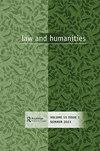编辑
IF 0.3
Q3 LAW
引用次数: 0
摘要
本期以莎士比亚的《度量衡》开始和结束,这是一部具有准确先见之明的戏剧,它突出了文章的两个广泛主题:正义和不公正的表现,以及当制度和个人身份不一致时的归属问题。这些主题本身就很及时,因为这个问题是在美国支持的喀布尔政府垮台的夏末发表的:这一事件让成千上万的人在一个突然又一次受制于塔利班镇压和清教政策的国家面临着不确定的未来,有效地粉碎了妇女和女孩参与公共生活的希望。2021年6月,第三届法律与人文圆桌会议也以有时迷失方向和恐惧的变革经历为主题。这场活动(“变革与法律:希望、机遇、震惊和恐惧”)因疫情持续而第二次在网上举行,共有四篇引人入胜的论文:卡米尔·泽德勒和亚历山大·西齐克(格但斯克大学法律与行政学院),《法律美学:法律之美在疫情期间发挥作用吗?》?;Dorothea Endres(日内瓦研究生院),Norm针织;Lorna Cameron(林肯大学建筑与设计学院),《变革、机遇和法院系统:探索新冠肺炎后的未来中的通道、建筑和抱负》;以及Guilherme Vasconcelos Vilaça(墨西哥技术研究所),《神话在法律变革中的作用》。我们很高兴能够为来自世界各地的法律和人文学者提供这个平台,分享和交流新的想法和研究思路。2021年11月(在该杂志的网站和推特@law_humanities上)发布了2022年7月圆桌会议论文征集呼吁,欢迎就《时间与时间》发表法律和人文论文的摘要建议(截止日期2022年2月4日)。这一期的文章也是如此。在《在当代表演中代表受害者和罪犯:莎士比亚衡量标准中的理想和复杂性》一书中,Amanda Finch重点讲述了Josie Rourke最近的作品如何引起人们对受害者和罪犯的性别化剧本如何通过中途“翻转”角色来调节我们对性胁迫表演的解读,因此,该剧对男性异性恋胁迫的传统描述(由贞洁的伊莎贝拉的残忍副手安吉洛)和女性受害者的自卫性床戏被颠倒了。无论是在洛克的作品中,还是在芬奇的文章中,这种逆转的结果都远非“镜像”。芬奇的文章认为,女性在传统的“理想受害者”角色(我们习惯于将伊莎贝拉置于其中)和传统上赋予安吉洛的“复杂罪犯”角色中都是受害者。对于芬奇来说,表面上具有统治力和控制力的《伊莎贝拉2》本文章由计算机程序翻译,如有差异,请以英文原文为准。
Editorial
This issue starts and finishes with Shakespeare’s Measure for Measure – a play of unerring prescience and one which foregrounds the two broad themes of the articles: the performance of justice and injustice, and the question of belonging when institutional and personal identities fail to align. These themes are themselves timely given that this issue went to press at the end of a summer dominated by the fall of the US-backed government in Kabul: an event leaving many thousands with an uncertain future in a country suddenly and once again subject to the repressive and puritanical policies of the Taliban, and effectively dashing the hope that women and girls might participate in public life. The theme of the sometimes disorienting and fearful experience of change was also the theme of the third Law and Humanities Roundtable in June 2021. That event, (‘Change and the law: hope, opportunity, shock and dread’) held online for the second time due to the ongoing pandemic, featured four fascinating paper presentations: Kamil Zeidler and Aleksandra Szydzik (Faculty of Law and Administration, University of Gdańsk), Aesthetics of Law: Does the Beauty of Law Play any Role During Times of Pandemic?; Dorothea Endres (Graduate Institute, Geneva), Norm-knitting; Lorna Cameron (The School of Architecture & Design, University of Lincoln), Change, Opportunity, and Court Systems: Exploring Access, Architecture, and Aspirations in a Post Covid-19 Future; and Guilherme Vasconcelos Vilaça (Instituto Tecnológico Autónomo de México), The Role of Myth in Legal Change.We are delighted to be able to offer this platform for law and humanities scholars from all over the world to share and exchange new ideas and lines of inquiry. A call for papers for the July 2022 Roundtable was circulated in November 2021 (on the journal’s website and on twitter @law_humanities) and abstract proposals for law and humanities paper presentations on Time and Temporalities are welcome (deadline Feb 4th 2022). So to the articles of this issue. In ‘Representing victims and offenders in contemporary performance: the ideal and the complex in Shakespeare’s Measure for Measure’, Amanda Finch focuses on how Josie Rourke’s recent production calls attention to how gendered scripts for victims and perpetrators condition our readings of performances of sexual coercion, by ‘flipping’ the roles halfway through, such that the play’s traditional depiction of male heterosexual coercion (by the cruel Deputy Angelo of the chaste Isabella) and a self-defensive bed-trick by the female victim is reversed. The outcome of this reversal, both in Rourke’s production, and in Finch’s article, is far from a ‘mirror’ image. Finch’s article argues that women are victimized both in the traditional ‘ideal victim’ role that we are used to finding Isabella in, and in the ‘complex offender’ role traditionally given to Angelo. For Finch, the ostensibly dominant and controlling ‘Isabella 2’
求助全文
通过发布文献求助,成功后即可免费获取论文全文。
去求助
来源期刊

Law and Humanities
LAW-
CiteScore
1.00
自引率
0.00%
发文量
21
期刊介绍:
Law and Humanities is a peer-reviewed journal, providing a forum for scholarly discourse within the arts and humanities around the subject of law. For this purpose, the arts and humanities disciplines are taken to include literature, history (including history of art), philosophy, theology, classics and the whole spectrum of performance and representational arts. The remit of the journal does not extend to consideration of the laws that regulate practical aspects of the arts and humanities (such as the law of intellectual property). Law and Humanities is principally concerned to engage with those aspects of human experience which are not empirically quantifiable or scientifically predictable. Each issue will carry four or five major articles of between 8,000 and 12,000 words each. The journal will also carry shorter papers (up to 4,000 words) sharing good practice in law and humanities education; reports of conferences; reviews of books, exhibitions, plays, concerts and other artistic publications.
 求助内容:
求助内容: 应助结果提醒方式:
应助结果提醒方式:


